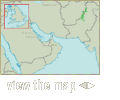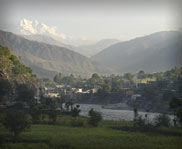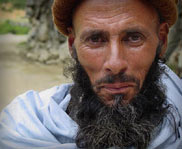|
+ "Border Town" 2 September, Chitral to Arandu
from Martin Smith 
 "Marty, you've got to come and see this."
"Marty, you've got to come and see this."
Scott has climbed onto the roof of our crappy little hotel in Chitral. I'm down in the "garden," waiting for breakfast. An open sewer runs nearby and soon I'll be losing my appetite. But at least I've had a shower -- a cold one -- and for that I'm grateful. Very few hotels in this region have hot water and some have no water. Some no water and no electricity. The prices are good though. Three dollars a night.
"I'll be up in a minute."
I expect to see a good view of the raging Shi Shi river and the nomads camped along its banks. I climb up the stairs and walk around to where Scott is shooting the scene off the tripod. It is spectacular. The foreground is as I anticipated, but looking farther up river beyond where the Chitral valley ends and towering over several silhouetted mountain ridges is the massive, snow-covered crest of Tirich Mir. At over 23,000 feet, this is the highest point in the Hindu Kush range. Tirich Mir translates as "highest elder."
Before 9/11, Chitral was a trekker's paradise, a launch pad for adventure travel tours of the surrounding mountains. A few Japanese climbers still trickle up and some Europeans, but apparently no Americans come this way anymore. We checked. Along the way up and over the 10,000 foot Lowari pass, we flipped through the back pages of all the guard post registers and found only two Americans have identified themselves as such since October of 2001. One was another journalist whose name we recognized, the other a "computer technician," who, of course, we didn't know. We joke that the techie must be a spy.
 |  |
 |  |
 |
| The village of Chitral along the Shi Shi River in Northern Pakistan. In the background looms the highest mountain in the Hindu Kush, Tirich Mir. (Photo by Scott Anger) |
 |
Fortunately, we have the town of Chitral to ourselves. Before pushing on, after eggs and Sanka, we spend a little time shopping the bazaar. We pick up an Afghan carpet for the office back home, one decorated with helicopters, tanks and machine guns. We figure a political rug is appropriate, given the kind of work we do. Plus, I've been struck by these carpets before, seeing them in the offices of other reporters and producers back home. When I see them I always think of the young girls who weave them. What were they thinking? Are these decorations employed out of fondness, awe or respect for the weapons of war? Or are they trying to say help us, this is all we have known, and it is the only art we can make? Whatever the answer might be, I am sure that the 100 dollars I spend on their weaving will not benefit them much either. The merchant who has purchased these carpets for next to nothing will pocket the money.
By noon, we leave Chitral heading out for the nearest post on the Afghanistan-Pakistan border, at Arandu. Shameem has a plan to fool the Frontier Corps at the next check post by telling them we are just locals out for a drive in the mountains. I am happy that I learned of this later, because there is no way I would have felt that we looked like locals out for a weekend drive. Scott, Marcela and I are all dressed in local garb. But only Scott looks vaguely native, and even there his nose is a problem. It turns slightly up not slightly down. Marcela's a blonde who can't seem to keep her head covered all the time. And I'm 6-foot 6, beardless, and look like a Connecticut Yankee -- the kind that goes to Yale and joins the CIA. The truth is I'm not from Connecticut, couldn't get into Yale, and never considered joining the CIA. But I can't explain that to a Pakistani border guard who is a closet jihadi.
Anyway, we manage to pass inspection thanks to Shameem. We don't dare film the passage, though I am tempted to pull out the camera since the soldiers have built a huge sign here that says "We Desire Death More Ardently Than You Desire Life," written in both English and Urdu. There is another message written with white-washed rocks arranged in a circle on the opposite hillside. It quotes Richard Nixon, although I doubt they know it: "When the Going Gets Tough, the Tough Get Going."
We get going. It is a three-hour, organ-jarring drive down a rugged, narrow mountain valley. The muddy Shi Shi river, with what look like Class 5 rapids, runs along side and straight below. The driver seems to know what he is doing, which is good, because where the road has been eroded by the monsoon we drive just a few inches from a sheer cliff of crumbling rock. On the other side of the road, there is marijuana growing everywhere. The locals, I find out later, do smoke this stuff. But the real cash crop in this region is opium poppy.
We arrive at our destination in the late afternoon. Arandu is a border town of mud brick houses. Here we stand a hundred yards up a dirt road from the Afghan border and talk to a group of locals. Like the people with whom we spoke the day before, they say they have seen no Arab fighters, no Al Qaeda, no Taliban. What they have seen in this remote corner is Americans.
 |  |
 |  |
 |
| Goat herder near the Lowari Pass (10,900 ft) in the Hindu Kush Range. (Photo by Martin Smith) |
 |
"Just two days ago, there was an American man who came here in civilian dress," says one man. "He talked to the village elder over there." He points across to the Afghan side. "Then he left and drove north. He was with some tribal chiefs from Asadabad, in Afghanistan."
"Yes, I hear there are U.S. troops there?" I am asking.
"I don't know, but there are troops in Asmar."
"Where is that?" I've never heard of Asmar.
A few people who have gathered by now gesture down the valley. I gather it is close. A man says it is just about three hours. On these roads I know that three hours is only about 40 to 50 kilometers, or about 30 miles. "There are more than 250 troops there. And American helicopters are flying here." This is new to us. I wonder what the Americans are finding or whose intelligence they are using.
Is there reason to think that Al Qaeda fighters are nearby? We also hear a local rumor that the road we just traveled was used as an escape route by some "Al Qaeda VIP's after the Tora Bora battle." Another man tells me that the Americans came here and took pictures. "Not journalists, government men." Huh.

< previous dispatch + next dispatch >

|
London
(Aug. 13-14) |
+ Zubaydah Is Dead
13 August, London |
+ Armchair Jihadists
14 August, London |
Gulf of Oman
(Aug. 15-21) |
+ Faces at a Dubai Mall
15 August, Dubai, U.A.E. |
+ HMCS Algonquin
16 August, somewhere in the Gulf of Oman |
+ On Board the Algonquin
17-18 August, somewhere in the Gulf of Oman |
+ Like an Elephant Chasing a Mouse
17-18 August, Gulf of Oman |
+ Dubai to Karachi
20 August |
+ A Firehose of Information
20-21 August, Dubai - Muscat - Chennai |
Pakistan
(Aug. 22-29) |
+ Old Hash
22 August, Islamabad |
+ Nuclear Neighbors
22-23 August, Islamabad |
+ We Believe in God
24 August, Islamabad |
+ Paranoid in Peshawar
27 August, Peshawar |
+ Bombs or Dust Devils
27-28 August, Peshawar |
+ Rumors and Half Truths
28 August, Peshawar |
Pakistan Border Lands
(Aug. 30-Sept. 4) |
+ On the Road to Chitral
30 August, Dir Khas |
+ Prisoners' Dilemma
31 August, Dir |
+ In the Northwest Frontier
30-31 August, Dir |
+ Border Town
2 September, Chitral to Arandu |
+ Don't Go to Timargarha
1-2 September, Drosh to Timargarha |
+ An American Informer
3-4 September, Peshawar |
Pakistan
(Sept. 5-23) |
+ Road to Nowhere
7 September, Islamabad to Faisalabad |
+ Faisal Town
7 September, Faisalabad |
+ Frustrations
9 September, Faisalabad |
+ The Plight of Women
10 September, Faisalabad |
+ A Little Noticed Gun Battle
10-13 September, Lahore-Karachi |
+ The Madrassa
14 September, Akora Khattak |
+ The Next Big Get
20 September, Karachi - Islamabad |
+ A Circle of Trust
21 September, Islamabad |
+ Indomitable
23 September, Islamabad |
Saudi Arabia
(Sept. 24-Oct. 2) |
+ Inside the Kingdom
24-25 September, Riyadh |
+ My Baffling Question
27 September, Unizah-Buraydah |
+ An Obedient Dissident
27 September, Buraydah |
+ An Audience with the Crown Prince
2 October, Riyadh |
Yemen
(Sept. 25-Oct. 10) |
+ Arriving in Yemen
25-26 September, Sana'a |
+ The Wedding Party
27 September, Sana'a |
+ A Talking Drug
28 September, Sana'a |
+ The World's Most Ancient Skyscrapers
3 October, Sana'a |
+ Americans Are Vampires
7 October, Sana'a |
+ Waiting for Rahma
9 October, Sana'a |
|